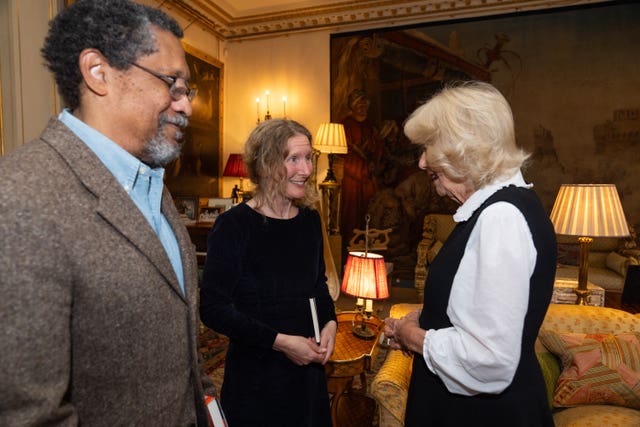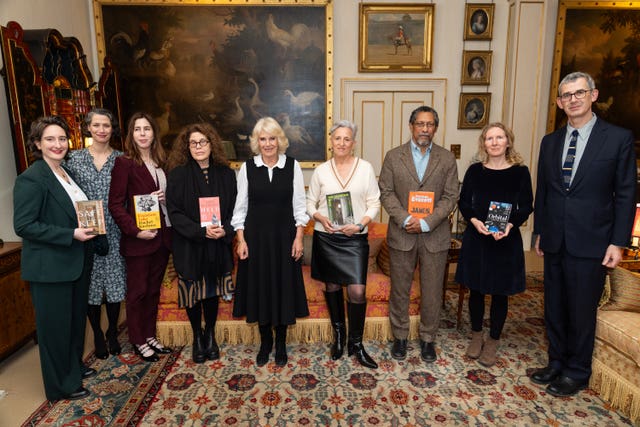Samantha Harvey becomes first woman since 2019 to win Booker Prize
Her book Orbital, about astronauts looking down at Earth, was named as the winner of the £50,000 prize.

British author Samantha Harvey has become the first woman since 2019 to win the Booker Prize.
Her book Orbital, about astronauts looking down at Earth, was named as the winner of the £50,000 prize and trophy at a ceremony held at Old Billingsgate in the City of London.
Harvey, who was longlisted for the prestigious literary prize in 2009 for her debut novel The Wilderness, is the 19th woman to win since the first award in 1969. There have been 36 male winners.
On stage, she dedicated the prize to “everybody who does speak for, and not against the earth, for and not against the dignity of other humans, other life and all the people who speak for and call for and work for peace”.
Harvey also said: “I suppose it’s fair to say that no Booker speech has ever been made in a perfect world.
“It’s hard to not acknowledge the imperfections of the world that we live in today.”
The novelist, who nearly gave up writing the book, said that she originally thought “why on earth would anybody want to hear from a woman at her desk in Wiltshire writing about space, imagining what it’s like being in space when people have actually been there, and I lost my nerve with it”.

Five years ago, the gong went jointly to two women, British author Bernardine Evaristo for Girl, Woman, Other and Canadian novelist Margaret Atwood for The Handmaid’s Tale sequel The Testaments.
It was last won by a British author when Glasgow-born Douglas Stuart was named the 2020 Booker Prize winner for Shuggie Bain.
Gaby Wood, chief executive of the Booker Prize Foundation, said: “Orbital wins the prize in a year of geopolitical crisis, likely to be the warmest year in recorded history.
“A book about a planet ‘shaped by the sheer amazing force of human want’, about an ‘unbounded place’ with no wall or barrier visible from space, with all politics ‘an assault on its gentleness’, it is hopeful, timely and timeless.”
This year, a record number of women were shortlisted for the Booker, with five nominated in total.
Artist and chairman of the judges Edmund de Waal was asked about the optics if the one man on the list, Percival Everett, won for James, a powerful retelling of The Adventures Of Huckleberry Finn by Mark Twain, from the perspective of the enslaved Jim.
Mr de Waal dismissed the suggestion, saying that “there was no question, that anyone could have won this, irrespective of their background, their gender, their ethnicity, whatever, absolutely anyone”.
“There was absolutely no question of box ticking or of agendas or anything else in the room at all,” he added.

“It was simply about a novel.”
At 136 pages long, Orbital is the second shortest Booker winner, just behind Penelope Fitzgerald’s Offshore, which won the 1979 prize.
Harvey’s novel takes place over a 24-hour time frame, with 16 orbits around the Earth, and touches on the death of a loved one, a typhoon coming, and the fragility of human life.
Mr de Waal said: “As judges, we were determined to find a book that moved us, a book that had capaciousness and resonance, that we are compelled to share.
“We wanted everything. Orbital is our book.
“Samantha Harvey has written a novel propelled by the beauty of 16 sunrises and 16 sunsets.
“Everyone and no one is the subject, as six astronauts in the International Space Station circle the Earth observing the passages of weather across the fragility of borders and time zones.
“With her language of lyricism and acuity, Harvey makes our world strange and new for us.
“All year we have celebrated fiction that inhabits ideas rather than declaiming on issues, not finding answers but changing the question of what we wanted to explore.
“Our unanimity about Orbital recognises its beauty and ambition.
“It reflects Harvey’s extraordinary intensity of attention to the precious and precarious world we share.”
This year’s judges all agreed on the choice, and included novelist Sara Collins, The Guardian fiction editor Justine Jordan, Chinese-born professor and A Thousand Years Of Good Prayers writer Yiyun Li and musician, composer and producer Nitin Sawhney, who has collaborated with Sir Paul McCartney and won an Ivor Novello lifetime achievement gong.
BBC director-general Tim Davie joked at the event about having a “football presenting job” up for grabs in the wake of the corporation confirming on Tuesday that Gary Lineker will depart Match Of The Day at the end of the season.
Lineker, 63, who has presented the highlights programme since 1999, has a contract extension with the broadcaster until the 2026 World Cup, the BBC said.

Earlier on Tuesday, the shortlisted authors – Yael van der Wouden, Rachel Kushner, Anne Michaels, Charlotte Wood, Everett and Harvey – attended a reception with the Queen, her first public engagement since falling ill with a chest infection.
On the royal family X account, a statement from Camilla said: “Many congratulations to Samantha Harvey on having won the Booker Prize Award 2024 with your brilliant novel, Orbital!”
Last year’s winner was Irish author Paul Lynch with his dystopian novel Prophet Song.





